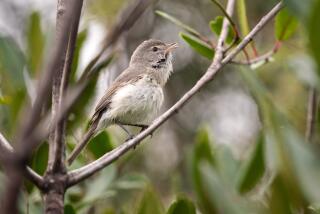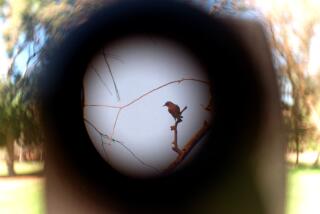The Wild Birds : SIX STORIES OF THE PORT WILLIAM MEMBERSHIP by Wendell Berry (North Point: $13.95; 160 pp.)
- Share via
Wendell Berry has recently earned his audience through his splendid essays. This thin volume echoes Berry’s concern in the essays with value, community and personal attachments while it returns us to his earlier, and in some ways more compelling, voice as a maker of stories.
Each of these simple tales provides a brief glimpse of life around Port William, Kentucky, the county seat at Hargraves, and the neighboring town of Goforth. As we move from the opening narrative of Wheeler Catlett’s trip to Louisville to rescue his drunk Uncle Peach in 1930, we watch the landscape lose its population. By the last story, set in 1967, we stand with Wheeler looking out at “a dying town in the midst of a wasting country.”
But if we witness threatening changes, we also learn of the dead and living “membership” of this decaying world, those who have realized their continuing obligation to the other laborers around them. Wheeler’s son Andy returns to Port William to nurse his dying grandfather through his last days. Wheeler finds himself instructing a young man about his right to own the land he has worked for years. And Wheeler in turn learns painful truths about paternity and secrecy from someone belatedly anxious to acknowledge his responsibilities in his will.
What survives the decay is a sense of linkage, a feeling that there is a need to pass on what one has made. In the solemnly beautiful “Boundary,” we watch a farmer pace the edges of his property, encountering memories that link the generations who have worked the land, and warding off exhaustion as he bids farewell to the rocks and soil and water that sustained and absorbed his days.
At his best, Berry provides a passionate feel for place and those who learn who they are by knowing where they dwell. This intimacy of person and context can sometimes seem insular: so embedded in shared experience as to exclude the nonbeliever. And the lack of high drama in the narratives places an enormous strain on Berry’s lyrical gifts to sustain our attention. But certain encounters, like the farmer’s with his life or Wheeler’s in the last pages with himself, prove to be glorious epiphanies stamped with the conviction borne of sustained attention to the elementary components and intimate relations of a small, and so knowable, world.
More to Read
Sign up for our Book Club newsletter
Get the latest news, events and more from the Los Angeles Times Book Club, and help us get L.A. reading and talking.
You may occasionally receive promotional content from the Los Angeles Times.









